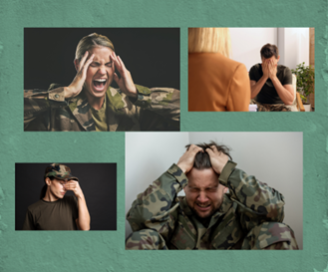Shock Is Both Protective and Destructive: The Hamster Wheel Cycle

The shock state can be either protective or destructive, depending on several variables.
Shock is extremely protective when traumatic things happen to us. For example, in a car accident where we see the other vehicle coming toward us, the crash or accident is inevitable and we suddenly go into a very quiet state of suspended animation. It feels like you are just floating through time and space and there is nothing you can do to change the course of events. When you hit the wall or the other vehicle, you may have the experience of watching your experience from an emotional distance, but not feeling the pain! Quite a miracle.
In my nearly forty years of working with sexually and physically abused people, they often describe similar experiences. This is exactly why some adults do not consciously remember that they were abused, or the details of early traumas. People often say things like, "I have a large gap in my memory when I was a child. I know my father or mother was an alcoholic but I just have no memory of what happened during those years." This is often because they were under the protective physiological changes brought on by our nervous system while trauma is happening. During and after shocking experiences, the body feels numb as a clever means to protect us from the unbearable physical and emotional pain from the accident or the abuse. We automatically go into a deep shock state, numb, not in the bodily experience and frozen in trance. And then of course there is all the social pressure to maintain the happy American family facade played every evening on our televisions: Father Knows Best, Leave it to Beaver, and the Brady Bunch.
When regressed through hypnosis, most people who have been physically or sexually abused, will describe floating up near the ceiling of their bedroom or becoming absorbed in the wallpaper next to their bed. They can describe in detail the pattern in the wallpaper, the flowered patterns painted on their childhood furniture, or perhaps the minute details contained within the painting that was hung on their bedroom wall. One child told me how many door knobs were in her house, as she escaped by mentally counting them through many hours of being sexually abused by her father.
So that is how shock protects us from experiencing the physiological and emotional traumas of our childhoods and even as adults. Now how does shock harm us? It harms us in several ways, especially if it is not addressed on the deep subconscious and physiological level.
Shock can be like the proverbial hamster, running around and around on the wheel. The hamster is stuck there in the pattern of endless circles of movement going nowhere. At first running around the wheel may be a good thing. The little hamster gets exercise in that tiny little cage in which he is trapped! Running around the wheel in frantic sympathetic shock prevents boredom. And for that reason, the shock has a positive effect on his body. And perhaps, just like shock protects us from seeing the horror of the trauma that actually happened to us, running around the wheel prevents him from neurotically chewing on things in his cage, or even on himself out of boredom and frustration.
But after a while, the hamster collapses from exhaustion and could even die. What happens to the shock that goes untreated in our bodies? I know a woman who has been a well respected professional dog trainer and athlete. About a year ago, her dog of 12 years started becoming ill and eventually she had to put him down. She was devastated, partially because she has never had children and, to her, her dogs truly were her children. At first she was in complete shock and couldn't talk about the loss. She said she couldn't feel anything and was numb. She was describing, of course, the shock state that was in part protecting her from the deep loss and grief she couldn't even begin to feel or express.
Because this woman was a professional, she felt she had an image to uphold. Some friends of hers suggested she go for hypnotherapy to release the shock in her body. She continued to put it off, stating, "I'm fine. I'll get through this myself." Like most people, our dog trainer somehow thought that time would heal this and it would all go away. Somehow, one day she would wake up and feel normal again. Well, over my forty years of working with traumatized people, I have witnessed that shock, if left untreated, does not get better, it just burrows deeper down within the person's body and causes more and more problems.
What problems does untreated shock cause in the body? First of all, it take a massive amount of energy to push away traumatic memories and at the same time to repress strong feelings such as grief, anger or fear. This repression causes exhaustion and so the person may find themselves sleeping a lot and having no energy to do their normal life activities. This lack of energy and loss of interest then can become debilitating. Some people go to see a doctor who may diagnose them as depressed and put them on antidepressant medication. They may also receive a variety of other drug treatments for their symptoms. The doctor may prescribe sleeping pills if they can't sleep, stimulants if they can't get out of bed in the morning, and on and on.
The next symptom we see is often unhealthy addictive behaviors. It is very common for the person who is in shock and feeling numb (parasympathetic shock) or frantic (sympathetic shock) to unconsciously begin to treat their own shock symptoms. They may use foods, alcohol, tobacco, marijuana, etc. to make themselves feel better and to numb their pain. Or they may go shopping, or gambling, or engage in unhealthy sexual practices. Now they are not only numbing the pain of the original traumatic event, but also the pain of the emptiness and loneliness caused by the effects of repressing the shock and the memories. They are running around that hamster wheel frantically, trying to stay alive.
This can only go on for so long until there is another form of wake up call to the person: some type of physical malady. Our dog trainer friend has now missed most of a year of dog shows and trials because, to put it in her words, "I've been sick all year!” I have watched this happen to so many people who seem to resist going for hypnotherapy for healing. The illness may take the form of colds and the flu, turning into bronchitis and pneumonia. It can take the form of intestinal problems, skin rashes or female problems. If all the early symptoms are just treated medically with drugs, then we can expect some new addictions to manifest and possibly more serious physical illnesses.
In Heart-Centered Hypnotherapy, we believe that our bodies carry a great deal of wisdom. We use this deep healing modality to discover the messages that our bodies are trying to give us when producing one physical symptom after another. This does not mean that the symptom or illness is not real. We do validate the reality and often the need for medical treatment. However, if we don't let the body speak to us and direct us to the source of the pain or dis-ease, our bodies may continue to yell out messages until we do finally listen and understand the underlying message.
{{cta('25928eee-7127-4709-95ac-9704deaf2e34')}}








